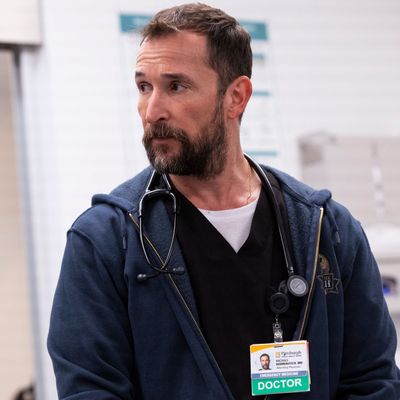
In the fourth episode of Max’s new medical drama The Pitt, a bickering brother and sister confront their elderly father’s impending death. The sister has finally reversed her initial decision to intubate her dad, which would have subjected him to a cascade of pointless extraordinary measures. Instead, Dr. Michael “Robbie” Robinavitch — played by Noah Wyle, who also wrote the episode and executive-produced the show — has been gently urging the siblings to give their dad an easier, more dignified death. There have been four deaths in Dr. Robbie’s emergency room already and he’s only four hours into his day. (That’s the show’s gimmick: Each episode is an hour of the shift.) As Dr. Robbie prepares the siblings for what to expect after their father is extubated, he pauses to tell them about a Hawaiian ritual he learned from his mentor. Thanks to Dr. Robbie’s traumatic flashbacks to peak Covid and the fact that no one has been able to stop mentioning it, we know that it’s the anniversary of said mentor’s death. There are just four simple things we need to say to a dying loved one that can help ease the early stages of grief, Dr. Robbie tells the siblings: “I love you, thank you, I forgive you, please forgive me.”
His voice is his superpower; it has a medium-low pitch that has acquired a hint of gravel over time, and he often somehow seems to whisper while speaking at a normal volume, which makes his dialogue feel intimate and emphatic at the same time. He gently starts the process of removing the tube from the old guy’s esophagus, narrating his actions respectfully to the patient every step of the way, then leaves the room before he can see whether or not the fractious siblings can bring themselves to be vulnerable enough to take his advice. About 30 seconds later, he’s overseeing a woman getting a dead cockroach removed from her ear.
That’s generally how things go for Dr. Robbie, unremittingly, for each of the eleven episodes I’ve seen so far. The other doctors do their work but at the crisis moment they call for Dr. Robbie, and he saves the day by swooping in to solve the problem himself, or walk a younger doctor through a challenging procedure with perfect patience. If we’re lucky, he then dispenses some hard-won, homespun wisdom after the patient’s stable. You wouldn’t necessarily know he’s in charge at Pittsburgh Trauma Medical Center, with his unkempt beard, faded hoodie, and Carharrts, except for the stethoscope and air of bone-deep exhaustion that bespeaks the heavy head of he who wears the crown. Also, he’s taller than everyone else, which has the effect of communicating nonverbally that he’s the ultimate authority in the room. (This is not a subtle show, which I mean as a compliment.)
And I love it. I have a deep, instinctual reaction of comfort and familiarity when Wyle is onscreen. This is in part because, for women and gays in our late 30s and early 40s, he was one of our foundational crushes in his prior incarnation as the babyfaced Dr. John Carter on the network drama ER, which ran from 1994 to 2009. For many viewers of The Pitt, Wyle represented their sexual awakening, and they’re now at the perfect age to appreciate his grizzled new incarnation. “I was obsessed with him when he was on ER,” my friend Amelia told me. “First crush.” Another cited his appearance on People magazine’s 2001 list of most beautiful people as being particularly formative for her sexuality. “He’s the number-one hunk in my friend group rn,” my 36-year-old friend Andrew told me. Something about how he’s aged, the way he’s traumatized but still working full steam ahead, contributes to his present-day allure. “I am transfixed by his performance in The Pitt. So world-weary, so broken. He is all of us,” another friend said. And of course, there’s that voice. “He was even hot on the Marc Maron podcast, which is audio-only,” my friend Lindsay said.
If Derek Shepherd, the Ur-hot doctor of Grey’s Anatomy, was dubbed McDreamy, then Dr. Robbie can only be McWeary. Like Dr. Shepherd, Dr. Robbie is classically handsome. But he also has deep circles under his eyes and crinkly crow’s feet. He is so profoundly overworked that at one point he has unzipped his Carhartts and is standing at a urinal only to be called away to an emergency before he even gets the chance to pee. Who among us cannot relate, and sympathize, with being too busy to urinate?
There are other good reasons to watch The Pitt, including the rest of its superb cast, which includes Child’s Play series veteran Fiona Dourif as reliable but slightly messy Dr. Cassie McKay and British TV and theater actress Tracy Ifeachor as Dr. Heather Collins, whose storyline packs a whole Grey’s season’s worth of pathos into a handful of shift hours. We learn much more about the nurses, new interns, and other doctors’ personal lives than we do about Dr. Robbie’s, and that feels by design. If the show continues for future seasons, which it surely must, we can look forward to onion layers of his interiority being peeled back with continued agonizing slowness.
But for now, we can project whatever we want onto him. Andrew and his group chat even treasured a hope that he was gay for the first few episodes, until he mentioned an ex-girlfriend (bisexuality seems outside the scope of The Pitt). We can even imagine that, via some kind of television magic, he’s the future version of his ER character, all grown up and living under an assumed identity in Pittsburgh. It’s not true, but at the same time, it’s spiritually true. It makes it seem possible that all the TV characters we’ve ever loved will one day reincarnate, not simply recast but reinvented as the most satisfying, meet-the-moment versions of themselves.


